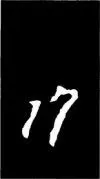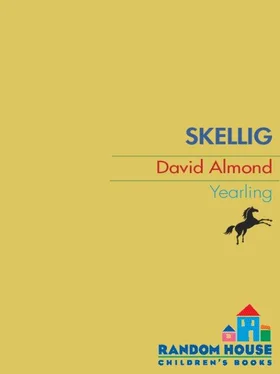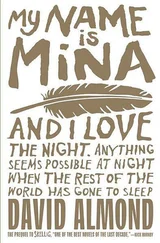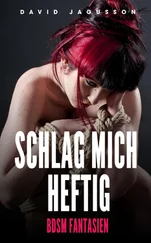David Almond - Skellig
Здесь есть возможность читать онлайн «David Almond - Skellig» — ознакомительный отрывок электронной книги совершенно бесплатно, а после прочтения отрывка купить полную версию. В некоторых случаях можно слушать аудио, скачать через торрент в формате fb2 и присутствует краткое содержание. Год выпуска: 2011, ISBN: 2011, Издательство: Random House Children's Books, Жанр: Фэнтези, Детская проза, на английском языке. Описание произведения, (предисловие) а так же отзывы посетителей доступны на портале библиотеки ЛибКат.
- Название:Skellig
- Автор:
- Издательство:Random House Children's Books
- Жанр:
- Год:2011
- ISBN:9780385729888
- Рейтинг книги:5 / 5. Голосов: 1
-
Избранное:Добавить в избранное
- Отзывы:
-
Ваша оценка:
- 100
- 1
- 2
- 3
- 4
- 5
Skellig: краткое содержание, описание и аннотация
Предлагаем к чтению аннотацию, описание, краткое содержание или предисловие (зависит от того, что написал сам автор книги «Skellig»). Если вы не нашли необходимую информацию о книге — напишите в комментариях, мы постараемся отыскать её.
Skellig — читать онлайн ознакомительный отрывок
Ниже представлен текст книги, разбитый по страницам. Система сохранения места последней прочитанной страницы, позволяет с удобством читать онлайн бесплатно книгу «Skellig», без необходимости каждый раз заново искать на чём Вы остановились. Поставьте закладку, и сможете в любой момент перейти на страницу, на которой закончили чтение.
Интервал:
Закладка:
I shined the flashlight on his white face.
“You again,” he squeaked.
“More 27 and 53,” I said.
“Food of the gods,” he said.
I squeezed through the tea chests to his side, held the tray for him, and he hooked the food out with his finger. He slurped and licked and chewed.
“Nectar,” he whispered.
“How do you know about 27 and 53?” I said.
“Ernie’s favorite. Used to hear him on the phone. 27 and 53, he used to say. Bring it round. Bring it quick.”
“You were in the house?”
“In the garden. Used to watch him through the windows. Used to listen to him. He was never very well. Couldn’t eat it all. Used to find his leavings in the bin next morning. 27 and 53. Sweetest of nectars. Lovely change from spiders and mice.”
“Did he see you? Did he know you were there?”
“Never could tell. Used to look at me, but look right through me like I wasn’t there. Miserable old toot. Maybe thought I was a figment.”
He dropped a long sticky string of pork and bean sprouts onto his pale tongue.
He looked at me with his veiny eyes.
“You think I’m a figment?”
“Don’t know what you are.”
“That’s all right, then.”
“Are you dead?”
“Ha!”
“Are you?”
“Yes. The dead are often known to eat 27 and 53 and to suffer from Arthur Itis.”
“You need more aspirin?”
“Not yet.”
“Anything else?”
“27 and 53.”
He ran his finger around the tray and caught the final globs of sauce. He licked his pale lips with his pale tongue.
“The baby’s in the hospital,” I said.
“Some brown,” he said.
“Brown?”
“Brown ale. Something else Ernie used to have. Something else he couldn’t finish. Eyes bigger than his belly. Something else I used to dig out of the bin, long as the bottle hadn’t tipped over and spilled everything.”
“Okay,” I said.
“Brown ale. Sweetest of nectars.”
He belched, retched, leaned forward. I shined the light onto the great bulges on his back, beneath his jacket.
“There’s someone I’d like to bring to see you,” I said when he’d settled.
“Someone to tell you I’m really here?”
“She’s nice.”
“No.”
“She’s clever.”
“Nobody.”
“She’ll know how to help you.”
“Ha!”
He laughed but he didn’t smile.
I didn’t know why, but I started to tremble again.
He clicked his tongue and his breath rattled and sighed.
“I don’t know what to do,” I said. “The garage is going to bloody collapse. You’re ill with bloody arthritis. You don’t eat properly. I wake up and think of you and there’s other things I need to think about. The baby’s ill and we hope she won’t die but she might. She really might.”
He tapped his fingers on the garage floor, ran his fingers through the furry balls that lay there.
“She’s nice,” I told him. “She’ll tell nobody else. She’s clever. She’ll know how to help you.”
He shook his head.
“Damn kids,” he said.
“She’s called Mina,” I said.
“Bring the street,” he said. “Bring the whole damn town.”
“Just Mina. And me.”
“Kids.”
“What should I call you?”
“Eh?”
“What should I tell her you’re called?”
“Nobody. Mr. Nobody. Mr. Bones and Mr. Had Enough and Mr. Arthur Itis. Now get out and leave me alone.”
“Okay,” I said.
I stood up and started to back out between the tea chests.
I hesitated.
“Will you think about the baby?” I said.
“Eh?”
“Will you think about her in the hospital? Will you think about her getting better?”
He clicked his tongue.
“Please,” I said.
“Yes. Blinking yes.”
I moved toward the door.
“Yes,” I heard him say again. “Yes, I will.”
Outside, night had almost given way to day. The blackbird was on the garage roof, belting out its song. Black and pink and blue were mingling in the sky. I picked the cobwebs and bluebottles off myself. I heard the hooting as I turned back toward the house.
Hoot. Hoot hoot hoot.
I looked into the sky over the gardens and saw the owls heading homeward on great silent wings. I put my hands together and blew into the gap between my thumbs.
Hoot. Hoot hoot hoot.
Then I seemed to see a face, round and pale inside the darkness of an upstairs window in Mina’s house. I put my hands together again.
Hoot. Hoot hoot hoot.
Something answered.
Hoot. Hoot hoot hoot.
Chapter 17

AT LUNCHTIME I WENT TO HER front garden. She was sitting there on the lawn, on a spread-out blanket beneath the tree. She had her books, her pencils, her paints scattered around her. I was off school again. All morning I’d been clearing the backyard again. Dad had been working in the front room, painting, stripping the walls, getting ready to hang wallpaper.
“The mystery man,” she said. “Hello again.”
She had a book open at a skeleton of a bird. She’d been copying this into her sketchbook.
“You’re doing science?” I said.
She laughed.
“See how school shutters you,” she said. “I’m drawing, painting, reading, looking. I’m feeling the sun and the air on my skin. I’m listening to the blackbird’s song. I’m opening my mind. Ha! School!”
She picked up a book of poems from her blanket.
“Listen,” she said.
She sat up straight, coughed to clear her throat, held the opened book before her.
“But to go to school in a summer morn,
O! it drives all joy away;
Under a cruel eye outworn,
The little ones spend the day
In sighing and dismay.”
She closed the book.
“William Blake again. You’ve heard of William Blake?”
“No.”
“He painted pictures and wrote poems. Much of the time he wore no clothes. He saw angels in his garden.”
She beckoned me. I stepped over the wall, sat on the blanket by her.
“Be quiet,” she whispered. “Be very, very quiet. Listen.”
“Listen to what?”
“Just listen.”
I listened. I heard the traffic on Crow Road and the roads beyond. I heard birds singing. I heard the breeze in the trees. I heard my own breath.
“What can you hear?”
I told her.
“Listen deeper,” she said. “Listen harder. Listen for the tiniest sweetest noise.”
I closed my eyes and listened again.
“What am I listening for?” I said.
“It comes from above you, from inside the tree.”
“Inside the tree?”
“Just do it, Michael.”
I tried to concentrate on the tree, on the branches and leaves, on the tiny shoots that grew out from the branches. I heard the shoots and leaves moving in the breeze.
“It comes from the nest,” she said. “Just listen.”
I listened, and at last I heard it: a tiny squeaking sound, far off, like it was coming from another world.
I caught my breath.
“Yes!” I whispered.
“The chicks,” she said.
Once I’d found it, and knew what it was and where it was, I could hear it along with all the other, stronger noises. I could open my eyes. I could look at Mina. Then I could close my eyes again and hear the blackbird chicks cheeping in the nest. I could imagine them there, packed close together in the nest.
“Their bones are more delicate than ours,” she said.
I opened my eyes. She was copying the skeleton again.
“Their bones are almost hollow. Did you know that?”
Читать дальшеИнтервал:
Закладка:
Похожие книги на «Skellig»
Представляем Вашему вниманию похожие книги на «Skellig» списком для выбора. Мы отобрали схожую по названию и смыслу литературу в надежде предоставить читателям больше вариантов отыскать новые, интересные, ещё непрочитанные произведения.
Обсуждение, отзывы о книге «Skellig» и просто собственные мнения читателей. Оставьте ваши комментарии, напишите, что Вы думаете о произведении, его смысле или главных героях. Укажите что конкретно понравилось, а что нет, и почему Вы так считаете.







![David Jagusson - Fesselspiele mit Meister David [Hardcore BDSM]](/books/486693/david-jagusson-fesselspiele-mit-meister-david-har-thumb.webp)




